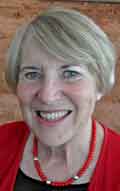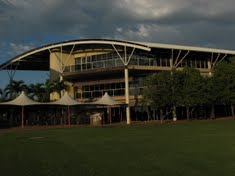
Charles Darwin University told to lift its game in Alice
By ERWIN CHLANDA
Darwin based CDU bosses who came to Alice Springs to gauge what the locals thought of their university got some robust messages about north-of-the-Berrimah-line decision making, the lack of meaningful co-operation with Desert Knowledge Australia (DKA) and the failure to entice young people to do their tertiary studies in their home town.
Vice-Chancellor Barney Glover and Deputy Vice-Chancellor Sharon Bell (pictured), busy adapting to new online teaching opportunities and looking north to buzzing Asia for business, met with 30-odd representatives from education, academia and NGOs in Alice Springs, some of whom made it clear that Charles Darwin University will need to look a lot harder in the other direction as well.
Although The Centre is “the most researched place in Australia, ” as Professor Bell put it, there is no unifying force to bind together the hundreds of academics, graduates and institutions in The Centre for them to jointly make a difference. They are a “huge resource, ” said Bruce Walker, long-time driving force of the Centre for Appropriate Technology, a partner in Desert Knowledge: “Can CDU do it?”
The “contained” nature of Alice makes it eminently suitable for events such as the Masters Games, yet CDU had not established itself in a way that would take advantage of that quality. And so the four kids Dr Walker brought up in The Alice, where they got “a good education, ” left town for their tertiary studies, and to “get a view of the world”.
Harold Furber (pictured), chairman of the Desert Peoples Centre, home of DKA, says his son went to Adelaide to study.
“Why go to Darwin?” he asked. “It is not the centre of the universe. We are not chained to CDU.”
He was critical of DKA not being mentioned in the presentation, and asked: “How could it operate with CDU?” He said DKA sees the world from an Alice Springs point of view – is that something CDU could accommodate? In any case the “parallel universes” of local education – one north and one south of The Gap – need to come to an end.
Prof Glover had no quarrel with this although he admitted having talked about it for three years, with “nowhere near enough progress”. How should the process start? he asked.
Dr Walker counseled against government involvement – “people just sit back” – and proposed a re-enactment of the process 15 years ago that kicked off Desert Knowledge: “Let’s all sit down again here for a discussion.” Mr Furber offered to call a meeting.
Prof Glover suggested the result could be a “centre of excellence, ” replacing what is now a piecemeal effort.
Alice-based CDU research professor Rolf Gerritsen said the university is “over centralized” in Darwin and “needs to have an internal discussion” about this. ”Organizational issues” are unclear to people who attend meetings and go home, none the wiser. ”Commitments are made in Darwin, not here, ” he said.
Professor John Wakerman, head of the Centre for Remote Health, which has close links with Flinders University in Adelaide, said the health professionals working here are increasingly fly-in, fly-out staff, staying just a short time, eroding the residential workforce. They are agency people “less well prepared now than 10 years ago for working out bush”.
Prof Bell said between 2009 and 2012, more than 200 VET qualifications have been offered through the Alice Springs campus – from Certificate I to Diploma level. She said there is significant demand in more than 25 fields of education: Introductory Vocational Education; Spoken and Written English; Horticulture; Conservation & Land Management; Rural Operations; Automotive; Electrotechnology; Business and Financial Services; Retail; Tourism and Hospitality; Aged Care; Youth Work; Mental Health; Education Support; Children’s Services; Carpentry; Building and Construction; Creative Industries, Music and Visual Art; IT; Engineering; Meat Processing; Fitness, Sport & Recreation; and Hairdressing.
About 2, 656 VET qualifications have been completed and more than 40 Higher Education (HE) qualifications had been offered through the Alice Springs Campus since 2009. There is significant demand in Tertiary Education Preparation; Commerce; Indigenous Languages and Linguistics; Nursing; Social Work; and Education, said Prof Bell.
About 790 students enrolled between 2009 and 2012 and more than 260 have completed. There are 13 additional HE and research staff located in Alice Springs, and three new buildings – HE, Community Services and new accommodation.






